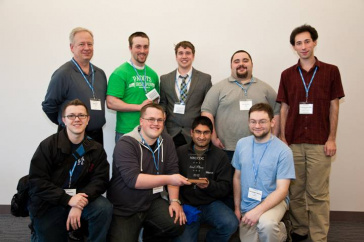UNH Professor's Book Provides New Understanding of the American Revolution

The UNH Wildhats computer security team celebrates its second-place win at the Northeast Collegiate Cyber Defense Competition recently. Front, left to right: Chris Hutchins, Alex MacPherson, Pavan Natti, Chris Neveu. Back, left to right: coach Ken Graf, David Fitzpatrick, Bryan Bickford, Sam Galletta, Frank Kreimendahl. Credit: Heratch Photography
DURHAM, N.H. - For most Americans, the Revolution's main achievement is summed up by the phrase "life, liberty, and the pursuit of happiness." But according to Eliga Gould, a history professor at the University of New Hampshire, the American founding was also a bid for inclusion in the community of nations as it existed in 1776 -- America aspired to diplomatic recognition under international law and the authority to become a colonizing power itself.
In his new book "Among the Powers of the Earth: The American Revolution and the Making of a New World Empire" (Harvard University Press, 2012), Gould shows how the American Revolution was an international transformation of the first importance. To conform to the public law of Europe's imperial powers, Americans crafted a union nearly as centralized as the one they had overthrown, endured taxes heavier than any they had faced as British colonists, and remained entangled with European Atlantic empires long after the Revolution ended.
"There is a sense in America that, as a democratic people, we made our own history," as opposed to "a history that was shaped by others," Gould says. "That view greatly exaggerates the power and capacity of the early American union. In fact, Americans were entering a world where there where all sorts of other groups that were in a position to help shape the history that they were going to be able to make."
Those groups included not only Native Americans and African Americans but Europe's other colonial powers and Britain, all of whom decisively intervened in American history.
"We think of the American Revolution as the moment when Americans began to make their own history. It actually would be more accurate to say it's the moment when we began to make the history that others were prepared to let us make," he says. "When Americans said they wanted independence, what they really wanted was independence under the authority of the law of nations."
As a result, Americans had to conform to international legal norms, from defense and enforcement of treaties to a readiness to extend those rights to other nations. Americans found this a challenge due, in part, to the weakness of the early American union.
"Although today we tend to think of the U.S. Constitution primarily for the rights and liberties it secured for American people, for the framers who met in Philadelphia in 1787, their primary goal was to secure the United States international recognition in Europe," Gould says.
To Gould, the history of the founding of America provides an important lesson - none of us are fully masters of our own destiny.
"Even as a nation, we find ourselves having to steer through difficult shoals and recognizing that we may not have complete independence to do exactly what we might like to do. It's comforting to know that the founders faced a very similar set of problems. Even though there were moments when they made missteps, they came through it. The hope is that we, too, today will find our way through it as they did then," he says.
The University of New Hampshire, founded in 1866, is a world-class public research university with the feel of a New England liberal arts college. A land, sea, and space-grant university, UNH is the state's flagship public institution, enrolling 12,200 undergraduate and 2,300 graduate students.
VIDEO
Eliga Gould, a history professor at the University of New Hampshire, discusses his new book "Among the Powers of the Earth: The American Revolution and the Making of a New World Empire."
http://www.youtube.com/watch?v=uh9YDiDlV_w&feature=player_embedded
-30-
Editors and Reporters: To receive a review copy of ""Among the Powers of the Earth: The American Revolution and the Making of a New World Empire,"" contact Margaux Leonard at Harvard University Press at mailto:margaux_leonard@harvard.edu"
Latest News
-
July 2, 2024
-
June 18, 2024
-
June 18, 2024
-
May 17, 2024
-
May 14, 2024

















































